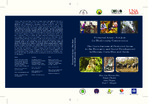Mostrar el registro sencillo del ítem
Protected Areas - Not just for Biodiversity Conservation. The Contributions of Protected Areas to the Economic and Social Development in Bhutan, Costa Rica and Benin
| dc.creator | Mongbo, Roch | |
| dc.creator | Floquet, Anne | |
| dc.creator | Choden, Sonam | |
| dc.creator | Moreno Díaz, Mary Luz | |
| dc.date.accessioned | 2011-05-07T13:24:53Z | |
| dc.date.available | 2011-05-07T13:24:53Z | |
| dc.date.issued | 2011 | |
| dc.identifier.isbn | 978-9930-9412-1-8 | |
| dc.identifier.uri | https://hdl.handle.net/10669/446 | |
| dc.description.abstract | Bhutan, Costa Rica and Benin. Could one possibly imagine more different contexts for a comparative study on protected areas than a coastal West African, a land locked Himalayan and a Mesoamerican mountainous emergent country? In spite of these differences, this book shows that the three countries have many issues in common, that make an assessment of the socio-economic benefits generated by protected areas particularly relevant for scientists, civil society and decision makers. The basic assumption in this book is that a systematic valuation of all the actual economic and social benefits derived by local and national communities from protected areas will shed substantial light on the societal importance of these ecosystems and allow informed public debate as to their conservation. Hence, the authors are rather concerned with tangible economic and social benefits derived from preserved natural ecosystems at local communities but also regional and national levels, here and now. In this respect, this book presents a systematic record and analysis of the contributions of the national parks, biological reserves and community forests to the economic and social development in Costa Rica, Benin and Bhutan. The challenge for the authors is to feed public debates and national policy making processes in nature conservation with concrete data on the actual roles played by these parks, biosphere reserves and community forests in economic and social processes locally, regionally and nationally. In addition to taking stock of the economic benefits and social networks induced by these ecosystems, the book gives a critical attention to the actual distribution of these benefits at different levels and among the stakeholders, questioning therefore their actual and potential contribution to social justice and local economic development. | es_ES |
| dc.description.sponsorship | Kingdom of Netherlands, FUNDECOOPERACION, CINPE-UNA-Costa Rica, Ministry of Agriculture and Forests-Bhutan, CEBEDES-Benin | es_ES |
| dc.description.sponsorship | Centro Internacional de Política Económica para el Desarrollo Sostenible (CINPE) | |
| dc.language.iso | en_US | es_ES |
| dc.publisher | Zeta Servicios Gráficos | es_ES |
| dc.subject | Wildlife conservation | es_ES |
| dc.subject | Sustainable development | es_ES |
| dc.subject | Economic and social development | es_ES |
| dc.subject | Costa Rica | es_ES |
| dc.subject | Bhutan | es_ES |
| dc.subject | Benin | es_ES |
| dc.subject | Áreas protegidas | es_ES |
| dc.subject | Conservación de recursos naturales | es_ES |
| dc.subject | Biodiversidad | es_ES |
| dc.subject | Conservación de vida silvestre | es_ES |
| dc.subject | Desarrollo sostenible | es_ES |
| dc.subject | Desarrollo social | es_ES |
| dc.subject | Biodiversity | es_ES |
| dc.subject | Desarrollo económico | es_ES |
| dc.title | Protected Areas - Not just for Biodiversity Conservation. The Contributions of Protected Areas to the Economic and Social Development in Bhutan, Costa Rica and Benin | es_ES |
| dc.type | libro | |
| dc.description.procedence | UCR::Vicerrectoría de Docencia::Ciencias Básicas::Facultad de Ciencias::Escuela de Biología | es_ES |
Ficheros en el ítem
Este ítem aparece en la(s) siguiente(s) colección(ones)
-
Economía [123]



